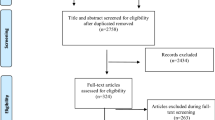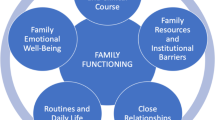Abstract
In the aftermath of discrete disasters, how families discuss the event has been linked with child well-being. There is less understanding, however, of how family communication affects adjustment to a protracted and ongoing public health crisis such as the COVID-19 pandemic. The present research leveraged a large longitudinal sample of families (N = 1884) across the United States and Canada to investigate factors that predicted family communication styles (active versus avoidant communication) about the COVID-19 pandemic and examined the longitudinal sequelae of mental health outcomes for youth associated with different family communication styles. Parents of youth between 5 to 17 years old completed surveys about their own mental health, their child’s mental health, and family communication about the COVID-19 pandemic at two time points 6 months apart. Overall, findings indicated that poorer parental mental health was related to greater use of avoidant communication, and avoidant communication styles were associated with poorer youth mental health over time. Findings suggest potential perils of avoidant family communication about ongoing threats and can help identify families at risk of negative mental health outcomes.
Similar content being viewed by others
References
Abel, M. R., Hambrick, E. P., & Vernberg, E. M. (2021). Talking with children about natural disasters: Maternal acknowledgment, child emotion talk, and child posttraumatic stress symptoms. Child & Youth Care Forum, 50, 947–968. https://doi.org/10.1007/s10566-021-09605-5.
Aknin, L. B., De Neve, J. E., Dunn, E. W., Fancourt, D. E., Goldberg, E., Helliwell, J. F., Jones, S. P., Karam, E., Layard, R., Lyubomirsky, S., Rzepa, A., Saxena, S., Thornton, E. M., Vanderweele, T. J., Whillans, A. V., Zaki, J., Karadag, O., & Amor, B., Y (2022). Mental health during the first year of the COVID-19 pandemic: A review and recommendations for moving forward. Perspectives on Psychological Science, 17(4), 915–936. https://doi.org/10.1177/17456916211029964.
American Psychological Association (2020). Stress in the time of COVID-19. Retrieved from https://www.apa.org/news/press/releases/stress/2020/report.
Anderson, R. E., Jones, S., Anyiwo, N., McKenny, M., & Gaylord-Harden, N. (2019). What’s race got to do with it? Racial socialization’s contribution to black adolescent coping. Journal of Research on Adolescence, 29, 822–831. https://doi.org/10.1111/jora.12440.
Antony, M. M., Bieling, P. J., Cox, B. J., Enns, M. W., & Swinson, R. P. (1998). Psychometric properties of the 42-item and 21-item versions of the Depression anxiety stress Scales in clinical groups and a community sample. Psychological Assessments, 10(2), 176–181. https://doi.org/10.1037/1040-3590.10.2.176.
Campbell-Sills, L., Norman, S. B., Craske, M. G., Sullivan, G., Lang, A. J., Chavira, D. A., Bystritsky, A., Sherbourne, C., Roy-Byrne, P., & Stein, M. B. (2009). Validation of a brief measure of anxiety-related severity and impairment: The overall anxiety severity and impairment scale (OASIS). Journal of Affective Disorders, 112, 92–101. https://doi.org/10.1016/j.jad.2008.03.014.
Carpenter, A. L., Elkins, M. R., Kerns, C., Chou, T., Green, G., J., & Comer, J. S. (2017). Event-related household discussions following the Boston Marathon bombing and associated posttraumatic stress among area youth. Journal of Clinical Child and Adolescent Psychology, 46(3), 331–342. https://doi.org/10.1080/15374416.2015.1063432.
Comer, J. S., Furr, J. M., Beidas, R. S., Weiner, C. L., & Kendall, P. C. (2008). Children and terrorism-related news: Training parents in coping and media literacy. Journal of Consulting and Clinical Psychology, 76(4), 568. https://doi.org/10.1037/0022-006X.76.4.568.
Comer, J. S., Conroy, K., Cornacchio, D., Furr, J. M., Norman, S. B., & Stein, M. B. (2022). Psychometric evaluation of a caregiver-report adaptation of the overall anxiety severity and impairment scale (OASIS) for use with youth populations. Journal of Affective Disorders, 300, 341–348. https://doi.org/10.1016/j.jad.2021.12.113.
Donovan-Kicken, E., & Caughlin, J. P. (2011). Breast cancer patients’ topic avoidance and psychological distress: The mediating role of coping. Journal of Health Psychology, 16(4), 596–606. https://doi.org/10.1177/13591053103836.
Felix, E., You, S., Vernberg, E., & Canino, G. (2013). Family influences on the long term post-disaster recovery of puerto rican youth. Journal of Abnormal Child Psychology, 41(1), 111–124. https://doi.org/10.1007/s10802-012-9654-3.
Felix, E. D., Afifi, T. D., Horan, S. M., Meskunas, H., & Garber, A. (2020). Why family communication matters: The role of co-rumination and topic avoidance in understanding post-disaster mental health. Journal of Abnormal Child Psychology, 48(11), 1511–1524. https://doi.org/10.1007/s10802-020-00688-7.
Flanagan, J. C., Jaquier, V., Overstreet, N., Swan, S. C., & Sullivan, T. P. (2014). The mediating role of avoidance coping between intimate partner violence (IPV) victimization, mental health, and substance abuse among women experiencing bidirectional IPV. Psychiatry Research, 220, 391–396. https://doi.org/10.1016/j.psychres.2014.07.065.
Furr, J. M., Comer, J. S., Edmunds, J. M., & Kendall, P. C. (2010). Disasters and youth: A meta-analytic examination of posttraumatic stress. Journal of Consulting and Clinical Psychology, 78(6), 765–780. https://doi.org/10.1037/a0021482.
Green, B. L., Korol, M., Grace, M. C., Vary, M. G., Leonard, A. C., Gleser, G. C., & Smitson-Cohen, S. (1991). Children and disaster: Age, gender, and parental effects on PTSD symptoms. Journal of the American Academy of Child & Adolescent Psychiatry, 30(6), 945–951. https://doi.org/10.1097/00004583-199111000-00012.
Hendrickson, M. L., Abel, M. R., Vernberg, E. M., McDonald, K. L., & Lochman, J. E. (2020). Caregiver-adolescent co-reminiscing and adolescents’ individual recollections of a devastating tornado: Associations with enduring posttraumatic stress symptoms. Development and Psychopathology, 32, 151–161. https://doi.org/10.1017/S0954579418001487.
Hernandez, R. A., & Colaner, C. (2021). This is not the hill to die on. Even if we literally could die on this hill: Examining communication ecologies of uncertainty and family communication about COVID-19. American Behavioral Scientist, 65(7), 956–975. https://doi.org/10.1177/0002764221992840.
Huang, Y., Acquati, C., & Cheung, M. (2022). Family communication and coping among racial-ethnic minority cancer patients: A systematic review. Health & Social Care in the Community, 30, e605–e620.
IPBES, Workshop Report on Biodiversity and Pandemics of the Intergovernmental Platform on Biodiversity and Ecosystem Services, Daszak, P., das Neves, C., Amuasi, J., Hayman, D., Kuiken, T., Roche, B., Zambrana-Torrelio, C., Buss, P., Dundarova, H., Feferholtz, Y., Foldvari, G., Igbinosa, E., Junglen, S., Liu, Q., Suzan, G., Uhart, M., Wannous, C., Woolaston, K., Reidl, M., Brien, K., Pascual, U., Stoett, P., Li, H., & Ngo, H. T. (2020). IPBES secretariat, Bonn, Germany. https://doi.org/10.5281/zenodo.4147317.
Kerr, M. L., Fanning, K. A., Huynh, T., Botto, I., & Kim, C. N. (2021). Parents’ self-reported psychological impacts of COVID-19: Associations with parental burnout, child behavior, and income. Journal of Pediatric Psychology, 46(10), 1162–1171. https://doi.org/10.1093/jpepsy/jsab089.
Layne, S. P., Hyman, J. M., Morens, D. M., & Taubenberger, J. K. (2020). New coronavirus outbreak: Framing questions for pandemic prevention. Science Translational Medicine, 12(534), https://doi.org/10.1126/scitranslmed.abb1469.
Lovibond, S. H., & Lovibond, P. F. (1995). Manual for the Depression anxiety stress scales (2nd. ed.). Psychology Foundation.
Lowe, S. R., Manove, E. E., & Rhodes, J. E. (2013). Posttraumatic stress and posttraumatic growth among low-income mothers who survived Hurricane Katrina. Journal of Consulting and Clinical Psychology, 81(5), 877–889. https://doi.org/10.1037/a0033252.
Masten, A. S., & Narayan, A. J. (2012). Child development in the context of disaster, war, and terrorism: Pathways of risk and resilience. Annual Review of Psychology, 63, 227–257. https://doi.org/10.1146/annurev-psych-120710-100356.
McLean, K. C. (2005). Late adolescent identity development: Narrative meaning making and memory telling. Developmental Psychology, 41, 683–691. https://doi.org/10.1037/0012-1649.41.4.683.
NCTSN (2020). Helping Children Cope with the COVID-19 Pandemic National Child Traumatic Stress Network: Los Angeles, CA. Retrieved on July 26, 2023 from https://www.nctsn.org/resources/helping-children-cope-with-the-COVID-19-pandemic.
Orom, H., Cline, R. J. W., Hernandez, T., Berry-Bobovski, L., Schwartz, A. G., & Ruckdeschel, J. C. (2012). A typology of communication dynamics in families living a slow-motion technological disaster. Journal of Family Issues, 33(10), 1299–1323. https://doi.org/10.1177/0192513X11430821.
Park, C. L., Russell, B. S., Fendrich, M., Finkelstein-Fox, L., Hutchison, M., & Becker, J. (2020). Americans’ COVID-19 stress, coping, and adherence to CDC guidelines. Journal of General Internal Medicine, 35(8), 2296–2303. https://doi.org/10.1007/s11606-020-05898-9.
Peplak, J., Klemfuss, J. Z., & Yates, T. M. (2021). Parent-adolescent conversations about COVID-19 influence adolescents’ empathic concern and adherence to health protective behaviors. Journal of Adolescent Health, 69(6), 925–932. https://doi.org/10.1016/j.jadohealth.2021.08.013.
Pew Research Center (2020, March). Most Americans say Coronavirus outbreak has impacted their lives. Retrieved from https://www.pewresearch.org/social-trends/2020/03/30/most-americans-say-coronavirus-outbreak-has-impacted-their-lives/.
Polizzi, C., Lynn, S. J., & Perry, A. (2020). Stress and coping in the time of COVID-19: Pathways to resilience and recovery. Clinical Neuropsychiatry, 17(2), 59. https://doi.org/10.36131/CN20200204.
Prime, H., Wade, M., & Browne, D. T. (2020). Risk and resilience in family well-being during the COVID-19 pandemic. The American Psychologist, 75(5), 631–643. https://doi.org/10.1037/amp0000660.
Rodriguez, A. J., & Margolin, G. (2015). Parental incarceration, transnational migration, and military deployment: Family process mechanisms of youth adjustment to temporary parent absence. Clinical Child and Family Psychology Review, 18, 24–49. https://doi.org/10.1007/s10567-014-0176-0.
Russell, B. S., Hutchison, M., Tambling, R., Tomkunas, A. J., & Horton, A. L. (2020). Initial challenges of caregiving during COVID-19: Caregiver burden, mental health, and the parent–child relationship. Child Psychiatry & Human Development, 51(5), 671–682. https://doi.org/10.1007/s10578-020-01037-x.
Saez-Clarke, E., Comer, J. S., Evans, A. D., Karlovich, A. R., Malloy, L. C., Peris, T. S., Pincus, D. B., Salem, H., & Ehrenreich-May, J. (2022). Fear of illness & virus evaluation (FIVE) COVID-19 Scales for children – Parent/Caregiver report development and validation. Journal of Anxiety Disorders, 89, 102586. https://doi.org/10.1016/j.janxdis.2022.102586.
Sanders, M. R. (2019). Harnessing the power of positive parenting to promote wellbeing of children, parents and communities over a lifetime. Behavior Change, 36, 56–74. https://doi.org/10.1017/bec.2019.3.
Schafer, J. L., & Graham, J. W. (2002). Missing data: Our view of the state of the art. Psychological Methods, 7, 147–177. https://doi.org/10.1037/1082-989X.7.2.147.
Scott, C. K., Sonis, J., Creamer, M., & Dennis, M. L. (2006). Maximizing follow-up in longitudinal studies of traumatized populations. Journal of Traumatic Stress, 19, 757–769. https://doi.org/10.1002/jts.20186.
Tambling, R. R., Tomkunas, A. J., Russell, B. S., Horton, A. L., & Hutchison, M. (2021). Thematic analysis of parent–child conversations about covid-19: Playing it safe. Journal of Child and Family Studies, 30, 325–337. https://doi.org/10.1007/s10826-020-01889-w.
Tang, W., Zhao, J., Lu, Y., Zha, Y., Liu, H., Sun, Y., Zhang, J., Yang, Y., & Xu, J. (2018). Suicidality, posttraumatic stress, and depressive reactions after earthquake and maltreatment: A cross-sectional survey of a random sample of 6132 chinese children and adolescents. Journal of Affective Disorders, 232, 363–369. https://doi.org/10.1016/j.jad.2018.02.081.
Tang, S., Xiang, M., Cheung, T., & Xiang, Y. T. (2021). Mental health and its correlates among children and adolescents during COVID-19 school closure: The importance of parent-child discussion. Journal of Affective Disorders, 279, 353–360. https://doi.org/10.1016/j.jad.2020.10.016.
Weber, M., Alvariza, A., Kreicbergs, U., & Sveen, J. (2021). Family communication and psychological health in children and adolescents following a parent’s death from cancer. OMEGA- Journal of Death and Dying, 83, 630–648. https://doi.org/10.1177/0030222819859965.
Weisz, J. R., Vaughn-Coaxum, R. A., Evans, S. C., Thomassin, K., Hersh, J., Lee, E. H., Ng, M. Y., Lau, N., Raftery-Helmer, J. N., & Mair, P. (2020). Efficient monitoring of treatment response during youth psychotherapy: The behavior and feelings Survey. Journal of Clinical Child and Adolescent Psychology, 49, 737–751. https://doi.org/10.1080/15374416.2018.1547973.
Wolmer, L., Hamiel, D., Pardo-Aviv, L., & Laor, N. (2017). Addressing the needs of preschool children in the context of disasters and terrorism: Assessment, prevention, and intervention. Current Psychiatry Reports, 19, 40. https://doi.org/10.1007/s11920-017-0792-8.
Wu, Q., & Xu, Y. (2020). Parenting stress and risk of child maltreatment during the COVID-19 pandemic: A family stress theory-informed perspective. Developmental Child Welfare, 2(3), 180–196. https://doi.org/10.1177/2516103220967937.
Acknowledgements
Portions of this research were presented at the virtual meeting of the Society for Applied Research in Memory and Cognition (2021). The current study was partially supported by the Brock University COVID-19 Related Dean’s Discretionary Funds (Evans), and an American Psychological Foundation grant (Comer). The authors would like to thank all of the parents who participated in this study. The data and analyses that support our findings of this study are available from the corresponding author upon request.
Author information
Authors and Affiliations
Corresponding author
Ethics declarations
Completing Interests
The authors have no competing interests to declare
Additional information
Publisher’s Note
Springer Nature remains neutral with regard to jurisdictional claims in published maps and institutional affiliations.
Rights and permissions
Springer Nature or its licensor (e.g. a society or other partner) holds exclusive rights to this article under a publishing agreement with the author(s) or other rightsholder(s); author self-archiving of the accepted manuscript version of this article is solely governed by the terms of such publishing agreement and applicable law.
About this article
Cite this article
Malloy, L.C., Dykstra, V.W., Steen, L.A.R. et al. Avoidant Parent-Child Communication About COVID-19: A Longitudinal Investigation of Associations with Youth Adjustment Across the First 6 Months of the Pandemic. Res Child Adolesc Psychopathol 52, 253–266 (2024). https://doi.org/10.1007/s10802-023-01133-1
Accepted:
Published:
Issue Date:
DOI: https://doi.org/10.1007/s10802-023-01133-1




